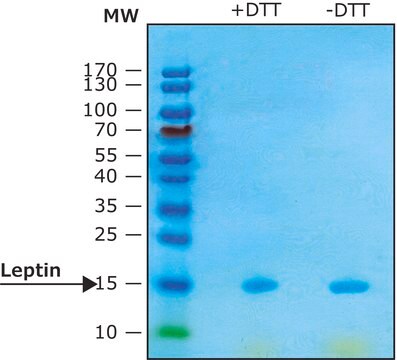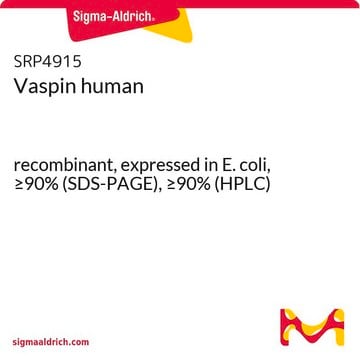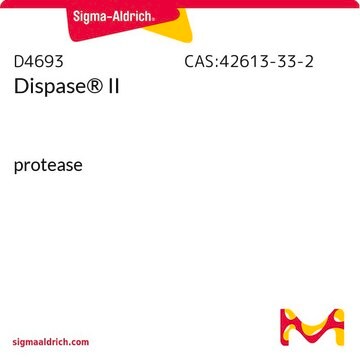SRP4901
Adiponectin human
recombinant, expressed in E. coli, ≥90% (SDS-PAGE)
Synonym(s):
ACDC, APM-1, Acrp30, AdipoQ, GBP-28
Sign Into View Organizational & Contract Pricing
All Photos(1)
About This Item
UNSPSC Code:
12352202
Recommended Products
biological source
human
recombinant
expressed in E. coli
Assay
≥90% (SDS-PAGE)
form
lyophilized
mol wt
~30 kDa
packaging
pkg of 25 μg
storage condition
avoid repeated freeze/thaw cycles
impurities
endotoxin, tested
NCBI accession no.
UniProt accession no.
shipped in
wet ice
storage temp.
−20°C
Gene Information
human ... ADIPOQ(9370)
General description
Adiponectin (also called Acrp30, AdipoQ) is an adipocyte specific secreted protein that circulates in the plasma. It is induced during adipocyte differentiation and its secretion is stimulated by insulin. The protein has a carboxyl-terminal globular domain and an amino-terminal collagen domain. The gene is mapped to human chromosome 3q27. Human adiponectin shares about 83% amino acid identity with that of mouse and about 90% with that of rat.
Application
Adiponectin human has been used to study the effect of adiponectin on androstenedione secretion and oxidative stress in rodent model.
Biochem/physiol Actions
Adiponectin (also called Acrp30, AdipoQ) has antiatherosclerotic and anti-inflammatory properties. It plays a role in various physiological processes such as energy homeostasis and obesity. Plasma levels of adiponectin are reduced in obese humans, and decreased levels are associated with insulin resistance and hyperinsulinemia. It exhibits antidiabetic action by interacting with adiponectin receptors, AdipoR1 and AdipoR2. Low levels of adiponectin are also linked with hypertension and dyslipidemia. Mutation in the gene at position 276G is linked with risk for endometrial cancer.
Physical form
Lyophilized from a 0.2 μm filtered solution in 25 mM Tris, 0.15 M NaCl, pH 7.4 containing 50 μg of bovine serum albumin (BSA) per 1 μg of adiponectin.
Reconstitution
Centrifuge the vial prior to opening. Avoid freeze-thaw cycles.
Recontitute in PBS containing at least 0.1% BSA to a concentration of 0.1-1.0 mg/mL. This stock solution can then be diluted into other aqueous buffers and stored at 4°C for 1 week or –20°C for future use.
Analysis Note
Activity of human recombinant adiponectin is measured by its ability to inhibit proliferation of mouse myeloid cell line M1. The ED50 for the effect is typically 1-7 μg/ml.
Storage Class Code
11 - Combustible Solids
WGK
WGK 3
Flash Point(F)
Not applicable
Flash Point(C)
Not applicable
Certificates of Analysis (COA)
Search for Certificates of Analysis (COA) by entering the products Lot/Batch Number. Lot and Batch Numbers can be found on a product’s label following the words ‘Lot’ or ‘Batch’.
Already Own This Product?
Find documentation for the products that you have recently purchased in the Document Library.
Eric R Hugo et al.
Environmental health perspectives, 116(12), 1642-1647 (2008-12-17)
The incidence of obesity has risen dramatically over the last few decades. This epidemic may be affected by exposure to xenobiotic chemicals. Bisphenol A (BPA), an endocrine disruptor, is detectable at nanomolar levels in human serum worldwide. Adiponectin is an
Thorhallur I Halldorsson et al.
Environmental health perspectives, 120(5), 668-673 (2012-02-07)
Perfluoroalkyl acids are persistent compounds used in various industrial -applications. Of these compounds, perfluorooctanoate (PFOA) is currently detected in humans worldwide. A recent study on low-dose developmental exposure to PFOA in mice reported increased weight and elevated biomarkers of adiposity
Donal O'Shea et al.
PloS one, 5(1), e8660-e8660 (2010-01-29)
Obese individuals who smoke have a 14 year reduction in life expectancy. Both obesity and smoking are independently associated with increased risk of malignancy. Natural killer cells (NK) are critical mediators of anti-tumour immunity and are compromised in obese patients
Effects of Adiponectin Including Reduction of Androstenedione Secretion and Ovarian Oxidative Stress Parameters In Vivo.
Comim FV
PLoS ONE, 11, e0154453-e0154453 (2016)
Jong-Rung Tsai et al.
PloS one, 10(12), e0144462-e0144462 (2015-12-15)
Adipose tissue is now considered as an endocrine organ involved in metabolic and inflammatory reactions. Adiponectin, a 244-amino acid peptide hormone, is associated with insulin resistance and carcinogenesis. Curcumin (diferuloylmethane) is the principal curcuminoid of the popular Indian spice, turmeric.
Articles
Lipid Induced Insulin Resistance
Our team of scientists has experience in all areas of research including Life Science, Material Science, Chemical Synthesis, Chromatography, Analytical and many others.
Contact Technical Service







